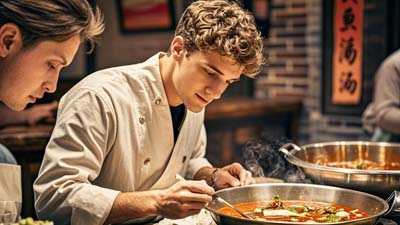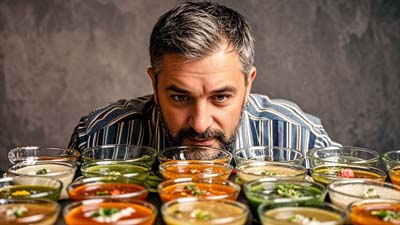
We have previously introduced Sichuan’s “麻辣(málà)” and Hunan’s “香辣(xiānglà)” flavors. In this last issue of our three-part sizzling-hot tour of China we will learn about one more unique kind of “spiciness” — the “酸辣(suānlà) sour spiciness” of “贵州(guìzhōu).” The special climate of Guizhou Province is, in a word, “天无三日晴(tiān wú sānrì qíng),” meaning “There are never three sunny days in a row.” GuiZhou’s climate is very moist and food is not easy to preserve, so the clever Guizhou people have created many ways to make “酸菜(suāncài) pickled vegetables” as a means of keeping their produce for spoiling. These creations lengthen the preservation time of food and have also led to the local people’s habit of making and eating pickled foods. In Guizhou Province there is a popular saying that goes “三天不吃酸,走路打窜窜(sāntiān bùchī suān, zǒulù dǎcuàncuàn),” meaning “Eating no pickled food for three days, one will walk feebly.”


“贵州(guìzhōu)” is known as “黔(qián)” for short, so Guizhou cuisine is also called “黔菜(qiáncài),” which is characterized by its spiciness and sourness. Its unique spicy flavor comes from the area’s great variety of Guizhou chilies, which produce a kind of piquancy so impressive and unforgettable that some people say it makes them get heartburn just thinking about Guizhou cuisine. There are a number of unique condiments exclusive to Guizhou Province. A common Guizhou family would have four forms of chilies in the pantry : “辣椒粉(làjiāofěn) chilli powder” as dipping sauce for some meats; “油辣椒(yóulàjiāo) fried pepper sauce” for on noodles; “糟辣椒(zāolàjiāo) fermented chili,” minced and similar to pickled vegetables, for vegetable cooking or fried rice; and dried “红辣椒(hónglàjiāo) red chilies” for stir-frying.

The popular Guizhou dish chosen as representative of “黔菜(qiáncài)” cuisine in this issue is “酸汤鱼(suāntāngyú) Fish in Sour Soup.”
When it comes to “酸汤鱼(suāntāngyú),” you first need to know something about “酸汤(suāntāng) sour soup.” Those who have visited Guizhou Province may find that nearly every family there has jars which are used for pickling foods. Some have one or two on hand, and others stock them by the dozen. Also, “酸汤(suāntāng)” has different classifications for its flavor, including “咸酸汤(xiánsuāntāng) salty and sour soup,” “辣酸汤(làsuāntāng) spicy and sour soup,” “麻辣酸汤(málàsuāntāng) tongue-numbing spicy and sour soup,” “鲜酸汤(xiānsuāntāng) fresh and sour soup,” “涩酸汤(sèsuāntāng) astringent and sour soup,” and so on.

Guizhou’s “酸汤鱼(suāntāngyú)” is known for its sour, pungent, and delicious taste which makes your mouth water and leaves you craving more. The soup used in the dish is the very “辣酸汤(làsuāntāng)” mentioned above. To cook “酸汤鱼(suāntāngyú),” you should first make the sour soup with a kind of special local pepper, many local, nutritious Chinese herbs, and tomatoes. Next, the fresh fish is stewed in the boiling soup. Guizhou Province is known to have the population with the longest life expectancy in the country, and credit for this should be given to “酸汤鱼(suāntāngyú),” whose sour soup brings on a big appetite, strengthens the spleen, and softens blood vessels. It is also said that it helps ladies to maintain their beauty and keep young!
As the Chinese sayings goes, “民以食为天(mín yǐ shí wéi tiān)” — “People regard food as their prime desire,” so if you travel to Guizhou Province one day, besides going sightseeing, you really have to taste the local “酸汤鱼(suāntāngyú)” and the area’s many varieties of pickled foods !

1. Why do Guizhou people have the habit of making and eating pickled foods?
A. Because pickled food is good for your health.
B. Because of its humid climate.
C. Because its soil is suitable for planting crops used for pickling.
2. Which is not the function of “酸汤(suāntāng)”?
A. Bring on an appetite.
B. Soften blood vessels.
C. Decrease internal heat.
3. Guizhou cuisine is also called ___.
A. “川菜(chuāncài)”
B. “湘菜(xiāngcài)”
C. “黔菜(qiáncài)”
Three “Spicy” Provinces in China (Part I) – Sichuan
Three “Spicy” Provinces in China (Part II) – Hunan
Chinese Culture
General Chinese (Beginner Level)
General Chinese (Intermediate Level)



